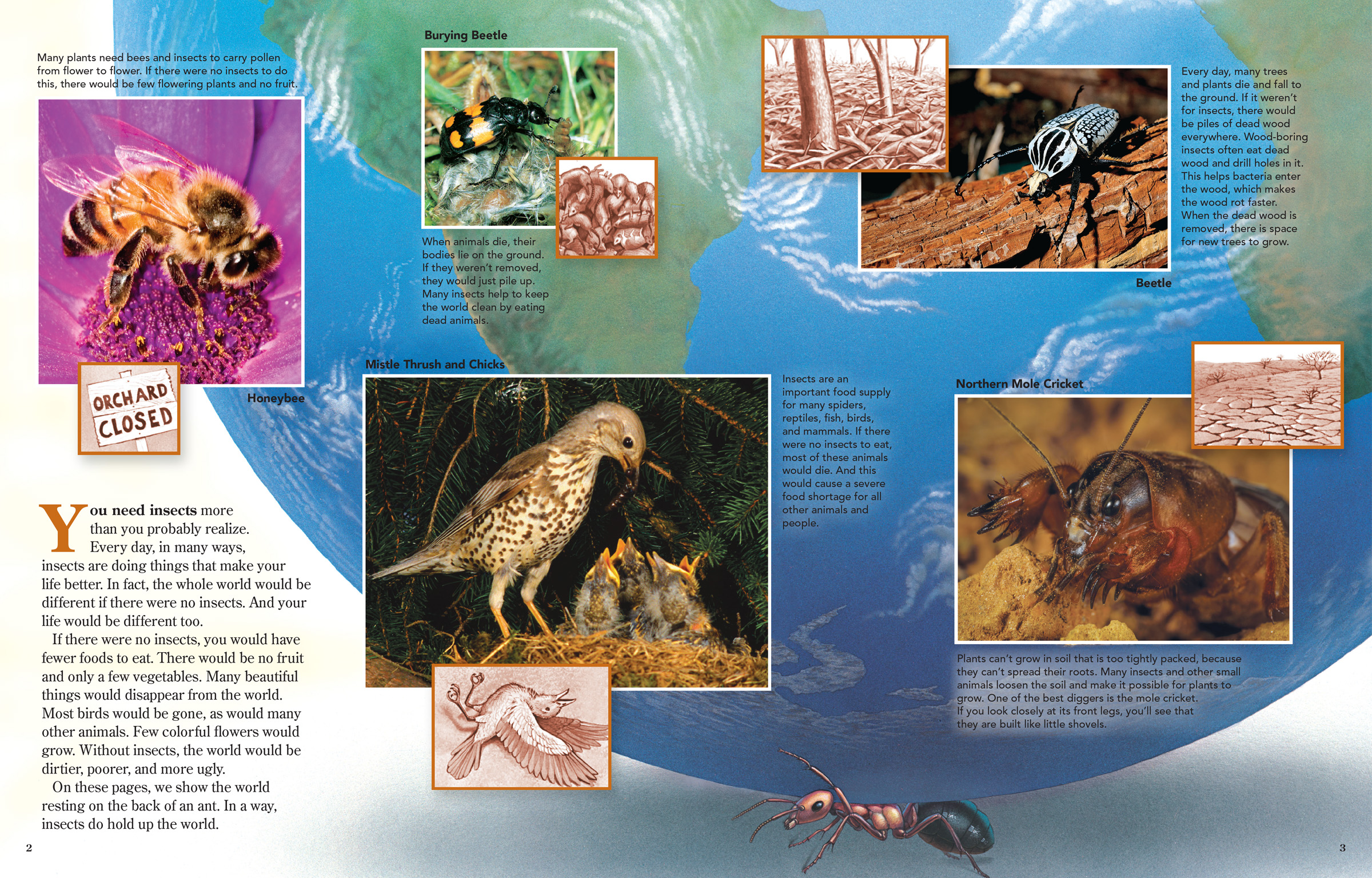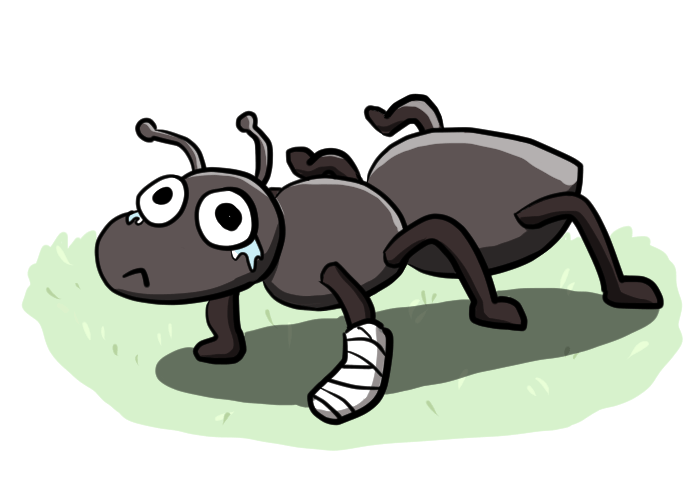Ants won’t die if you drop them because their low weight-to-surface area ratio prevents terminal velocity. Ants’ small size and body structure make it impossible for them to reach a lethal falling speed.
This unique adaptation allows ants to survive falls from any height without getting hurt. Despite their resilience to falls, ants face challenges related to surface tension, increasing their risk of drowning. Understanding these facts sheds light on the remarkable survival strategies of ants in various environments.
Whether dropping from a skyscraper or a tree branch, ants navigate their way through natural obstacles with extraordinary resilience and adaptability.

Credit: as-per-usual.tumblr.com
The Myth Of ‘Will An Ant Die If You Drop It?’
Have you ever wondered if ants can survive a fall from a great height? There is a common myth that ants will die if you drop them, but is this really true? Let’s delve into the science behind ant survival and explore the truth behind this popular belief.
The Science Behind Ant Survival
When it comes to the question of whether ants will die if you drop them, it’s important to understand the physical factors that affect their survival. Ants are incredibly small creatures with a low mass-to-surface area ratio, which means that their terminal velocity is much lower than larger animals like humans.
Exploring Terminal Velocity
Terminal velocity refers to the maximum speed that an object, in this case, an ant, can reach while falling through the air. Due to their small size and low mass, ants have a relatively low terminal velocity. This means that they cannot fall fast enough to cause any significant damage to themselves upon impact.
It’s similar to how a leaf falls slowly compared to a heavier object. The drag forces exerted on the ant by the air counteract the force of gravity, resulting in a slow and gentle descent.
Examining Ant Adaptations
Ants have also evolved various adaptations that contribute to their ability to survive falls. For instance, their exoskeleton provides a protective outer covering that helps absorb impact. Additionally, ants are resilient creatures that possess strong muscles and flexible joints, allowing them to withstand minor falls without sustaining serious injuries.
Beyond physical adaptations, ants are highly social insects that rely on their colony for survival. When an ant falls, it can rely on the assistance and support of its fellow colony members to resume normal activity. Ants work together to find food, build shelters, and protect one another, enhancing their chances of survival even if an individual ant experiences a fall.
In conclusion, the myth that ants will die if you drop them is unfounded. Due to their small size, low terminal velocity, and physical adaptations, ants can survive falls without any severe consequences. It is yet another fascinating aspect of these incredible creatures and the wonders of nature.
Factors Affecting Ant Survival
Ants’ ability to survive falls is influenced by several key factors. Understanding these factors sheds light on why ants can handle drops better than larger creatures.
Surface Area To Mass Ratio
The ratio of an ant’s surface area to its mass determines how quickly it falls and the impact it can withstand. Ants, being small, have a low surface area to mass ratio, reducing their terminal velocity and protecting them from harm.
Air Resistance Impact
Air resistance plays a vital role in an ant’s survivability when falling. Due to their tiny size, ants experience minimal air resistance, which slows down their fall compared to larger animals like humans.
Exoskeleton’s Protective Role
An ant’s exoskeleton acts as a protective shield, absorbing the shock of impact when they hit the ground. This exoskeleton provides structural support and enhances the ant’s ability to survive falls from various heights.
In conclusion, factors such as the ant’s surface area to mass ratio, air resistance impact, and the protective exoskeleton contribute to their remarkable ability to survive falls without harm.
Real-life Experiments And Observations
Delve into the intriguing world of ant experiments and observations to uncover the mysteries of their resilience and survival instincts.
The Action Lab’s Dropping Experiment
The Action Lab conducted a unique experiment of dropping an ant from a roof to test its survivability.
Effects Of Lactic Acid And Oleic Acid
In a fascinating study, lactic acid and oleic acid were applied to ants to observe their reactions and resilience.
Here’s a quick overview of the findings:
- Ants showed remarkable resilience even after exposure to lactic acid.
- The application of oleic acid did not hinder the ants’ ability to resume normal activities.
Ants’ Resilience In Challenging Scenarios
| Scenario | Observation |
|---|---|
| Freezing the Ant | Ants were able to recover from the freezing state. |
| Applying Oleic Acid | No long-term adverse effects were noted on the ants. |
| Colony Reintegration | Ants seamlessly reintegrated back into the colony post-experimentation. |

Credit: www.youtube.com
Insights Into Ant Behavior And Adaptability
Ants, like most creatures, are affected by the changing seasons. During the fall season, ants typically face challenges due to the decreasing temperatures. These cold temperatures can result in ants dying off or seeking shelter indoors. However, once inside, ants can thrive and remain active throughout the year, thanks to the comfortable climate-controlled conditions.
Have you ever wondered why ants don’t get hurt when they fall? It all comes down to their survival mechanisms. Ants are incredibly small creatures with a large ratio of surface area to mass. As a result, their terminal velocity, which is the speed at which air drag counters gravity acceleration, is much lower than larger animals like humans. Essentially, ants cannot fall fast enough to damage themselves, ensuring their safety even if they accidentally fall from a significant height.
Colony life holds great importance for ants. A lone ant would have a challenging time surviving if it were moved far away from its home. Ants rely on their colony for protection against attacks, shelter, and finding food. Without the cooperation and support of their fellow ants, a solitary ant would be extremely vulnerable and struggle to survive. Therefore, ants depend on the strength and interdependency of their colony for their well-being and continued survival.
Understanding The Resilience Of Ants
Ants are resilient creatures, and dropping them from even great heights does not guarantee their demise. Their small size and low terminal velocity prevent their falling speed from causing harm. Ants’ ability to survive such falls showcases their impressive resilience and adaptability.
Understanding the Resilience of Ants
Ants are known for their extraordinary resilience, often defying the odds when faced with environmental challenges. This raises the question: will an ant die if you drop it? Comparative studies with other species reveal some fascinating insights into the durability of ants. Addressing common misconceptions around the topic sheds light on their incredible adaptability. Additionally, exploring the potential implications for research and beyond reveals the significance of understanding the resilience of ants.
Comparative Studies with Other Species
When comparing ants with other organisms, their remarkable ability to withstand falls becomes evident. Unlike larger animals such as humans, ants have a considerably lower terminal velocity due to their small size and proportionally larger surface area. This significantly reduces the impact of a fall, making it unlikely for ants to sustain fatal injuries. The impressive resilience displayed by these tiny creatures has sparked fascination and admiration among researchers and enthusiasts alike.
Addressing Common Misconceptions
Despite their small size, ants’ capacity to endure falls is often misunderstood. Contrary to popular belief, the physical resilience of ants enables them to survive falls from great heights. This misconception arises from the assumption that the impact of a fall would be detrimental to these tiny insects. By debunking this misconception, we gain a deeper appreciation for the extraordinary adaptability of ants in various environments.
Potential Implications for Research and Beyond
The unparalleled resilience of ants holds significant implications for various fields, including biology, ecology, and material science. By studying and understanding the mechanisms behind their ability to survive falls, researchers can glean valuable insights that may inspire innovations in impact-resistant materials. Furthermore, exploring how ants navigate and adapt to challenging conditions can offer valuable lessons for human society, fostering a greater appreciation for the resilience of these remarkable creatures.
In conclusion, gaining a deeper understanding of the resilience of ants not only provides insights into their remarkable adaptability but also holds the potential to inspire advancements in various scientific and practical domains.

Credit: rangerrick.org
Frequently Asked Questions On Will Ant Die If You Drop
Can Ants Survive Being Dropped?
No, ants can survive being dropped because their small size and low weight-to-surface area ratio prevents them from reaching a terminal velocity that would cause harm.
Do Ants Go Away In The Fall?
Ants may die off or move indoors in the fall due to cold temperatures. They can survive indoors all year, remaining active in climate-controlled conditions.
Do Ants Get Hurt When They Fall?
Ants don’t get hurt when they fall. Their small size results in a lower terminal velocity, preventing damage.
Do Ants Die If You Move Them?
Moving ants far from their colony would likely cause them to die since they rely on their colony for survival. Without the protection, shelter, and food provided by the colony, lone ants are vulnerable and have difficulty surviving on their own.
Conclusion
Ants are incredibly resilient creatures and can survive being dropped from high heights. Due to their small size and low weight-to-surface area ratio, they do not experience terminal velocity and thus do not suffer any harm from falls. However, ants can drown easily due to their vulnerability to surface tension.
So while dropping an ant may not be fatal, it is important to be mindful of other dangers they may face.

I’m MD Tanvir, and I bring years of expertise gained from working closely with pest control companies to the forefront. My journey in the industry has inspired me to launch Bug Battler, a platform aimed at equipping people with the know-how to combat pests autonomously. Through Bug Battler, I aim to empower individuals with practical insights to tackle pest infestations effectively.

